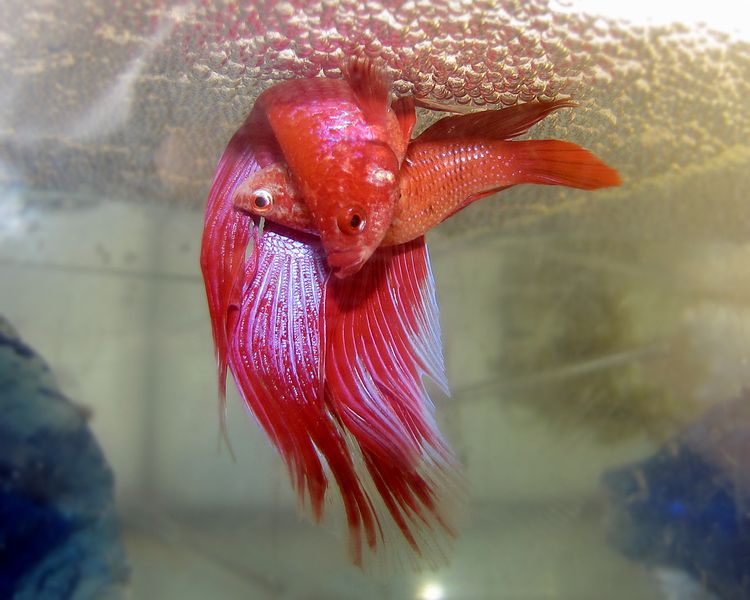Aquarium fish are fascinating creatures that can bring life and color to any home or office. However, many aquarium owners often wonder if their fish lay eggs. The answer is yes, most aquarium fish do lay eggs, but the process can vary depending on the species.
Some aquarium fish, such as cichlids and angelfish, are known to lay eggs on flat surfaces, such as rocks or other aquarium decorations. Other species, like guppies and mollies, give birth to live young instead of laying eggs. Understanding the breeding habits of your aquarium fish can help you create a healthy and thriving environment for your aquatic pets. So, let’s dive in and explore the fascinating world of aquarium fish reproduction!
Yes, most aquarium fish lay eggs. The egg-laying process varies depending on the species of fish. Some fish lay eggs that stick to surfaces, while others scatter their eggs. Some fish exhibit parental care of their eggs, while others abandon them. It is important to research the specific breeding habits of your aquarium fish to properly care for their eggs and offspring.

Does Aquarium Fish Lay Eggs?
Aquarium fish breeding is a common topic among fish enthusiasts, and the question of whether aquarium fish lay eggs is a popular one. The answer is yes, most aquarium fish do lay eggs. However, the process of laying eggs and caring for them varies between different species of fish.
How Do Aquarium Fish Lay Eggs?
Most aquarium fish lay eggs as part of their reproductive cycle. The female fish will release eggs into the water, and the male fish will fertilize them with his sperm. This process is known as spawning. The fertilized eggs will then develop into embryos, which will hatch into baby fish.
The process of spawning can vary between species of fish. Some fish will lay their eggs on plants or other surfaces in the aquarium, while others will scatter their eggs throughout the water. Some species of fish will also build nests or caves to protect their eggs and young.
How Do You Know If Aquarium Fish Are Laying Eggs?
If you’re interested in breeding your aquarium fish, it’s important to know the signs that they are ready to lay eggs. Female fish will often become more plump and round as their eggs develop. Male fish may become more aggressive or territorial as they prepare to fertilize the eggs.
You may also notice your fish engaging in courtship behaviors, such as chasing each other around the aquarium or performing mating dances. If you see your fish exhibiting these behaviors, it’s a good indication that they are ready to spawn.
Caring for Aquarium Fish Eggs
Once your aquarium fish have laid their eggs, it’s important to provide the proper care to ensure their survival. Some species of fish will care for their eggs and young themselves, while others will require human intervention.
If your fish are caring for their eggs and young, it’s best to leave them alone and avoid disturbing them. If you need to move the eggs or young for any reason, use a gentle touch and transfer them to a safe location in the aquarium.
If your fish are not caring for their eggs and young, you will need to provide the necessary care yourself. This may involve transferring the eggs to a separate container with the proper water conditions and providing them with food.
Benefits of Breeding Aquarium Fish
Breeding aquarium fish can be a rewarding and enjoyable experience for fish enthusiasts. It allows you to watch the entire life cycle of your fish, from eggs to adults. Breeding can also help to preserve endangered species of fish and ensure their survival.
Breeding your own fish can also save you money in the long run, as you won’t need to purchase new fish as frequently. Additionally, breeding can be a fun and educational activity for children and adults alike.
The Pros and Cons of Breeding Aquarium Fish
While breeding aquarium fish can be a rewarding experience, it’s important to consider the pros and cons before getting started. Some of the benefits of breeding have already been mentioned, but there are also some potential drawbacks.
Breeding can be time-consuming and requires a significant amount of effort and attention to detail. It also requires a certain level of knowledge and experience to ensure the health and well-being of the fish and their offspring.
Additionally, breeding can result in an overpopulation of fish in your aquarium, which can lead to a variety of problems. It’s important to carefully consider the potential outcomes before deciding whether to breed your aquarium fish.
Conclusion
In conclusion, most aquarium fish do lay eggs as part of their reproductive cycle. The process of laying and caring for eggs can vary between species of fish, and it’s important to carefully consider the potential benefits and drawbacks before deciding whether to breed your fish.
If you do decide to breed your aquarium fish, be sure to provide the proper care and attention to ensure their health and survival. With the right knowledge and experience, breeding can be a rewarding and enjoyable activity for fish enthusiasts of all ages.
Frequently Asked Questions
Here are some frequently asked questions about whether aquarium fish lay eggs or not.
Do all aquarium fish lay eggs?
Most aquarium fish lay eggs as part of their reproductive process. However, there are some species of fish that give birth to live young. These fish are known as livebearers, and they include guppies, mollies, and swordtails.
Livebearers do not lay eggs; instead, the eggs develop inside the female’s body until they are ready to hatch. The female then gives birth to live young that are fully formed and ready to swim.
How do aquarium fish lay eggs?
When aquarium fish lay eggs, the female releases eggs into the water, and the male fertilizes them with his sperm. The fertilized eggs then hatch into fry, which are baby fish.
Some species of fish lay their eggs on plants or other surfaces in the aquarium, while others scatter their eggs throughout the water. It is important to provide a suitable breeding environment for fish that lay eggs, such as plants or breeding cones, to ensure the eggs have a safe place to hatch and grow.
Can you tell if aquarium fish are about to lay eggs?
There are some signs that aquarium fish are about to lay eggs. Female fish may become more rounded in the abdomen as they develop eggs, and males may become more aggressive as they try to court the females and defend their territory.
Some species of fish may also display specific behaviors before laying eggs, such as bubble nesting or digging. It is important to research the specific breeding behaviors of the fish in your aquarium to anticipate when they may lay eggs.
What should you do if aquarium fish lay eggs?
If your aquarium fish lay eggs, it is important to provide a suitable environment for the eggs and fry to develop. This may involve moving the eggs to a separate breeding tank or providing suitable hiding places in the main aquarium.
You should also ensure that the water quality and temperature are suitable for the fish’s breeding needs and provide appropriate food for the fry as they grow and develop.
How long does it take for aquarium fish eggs to hatch?
The time it takes for aquarium fish eggs to hatch varies depending on the species of fish and the water temperature. Some fish may hatch within a few days, while others may take several weeks.
It is important to research the specific breeding and hatching times for the fish in your aquarium to ensure you are providing the appropriate care and attention to the eggs and fry.

Aquarium Goldfish Breeding/ Goldfisg laying eggs/Hand breeding goldfish
In conclusion, aquarium fish do lay eggs. The process of egg-laying is known as spawning, and it is an essential part of the life cycle of many fish species. Spawning can occur naturally or through induced breeding, depending on the type of fish and the breeding goals of the aquarium owner.
It is important to understand the spawning process and provide the necessary conditions for the eggs to hatch successfully. This involves maintaining the appropriate water temperature, pH levels, and lighting conditions, as well as providing suitable hiding places for the eggs and fry.
Overall, the ability of aquarium fish to lay eggs is an exciting and fascinating aspect of fishkeeping. With the right knowledge and care, fish owners can witness the beauty of the spawning process and contribute to the conservation of endangered fish species.
